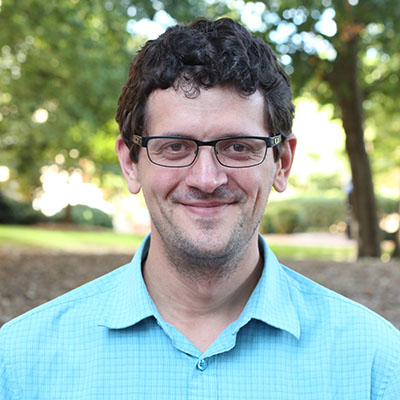Nate Hathaway, Ph.D.
Associate Professor, Division of Chemical Biology and Medicinal Chemistry
 PHONE
PHONE(919) 445-9327
natehat@email.unc.edu
ADDRESS
2077 Genetic Medicine Bldg, 120 Mason Farm Rd, CB# 7363, Chapel Hill, NC, 27599
DOWNLOAD CV
ACCEPTING DOCTORAL STUDENTS
Nate Hathaway, PhD is an assistant professor and a member of the Center for Integrative Chemical Biology and Drug Discovery and the Lineberger Comprehensive Cancer Center. His lab studies how chromatin is dynamically regulated in the cell, allowing for varying levels of gene expression or gene silencing. Dr. Hathaway’s research is focused on the discovery of new small molecules that inhibit epigenetic pathways both for research purposes and as potential future therapeutics.
The mammalian genome contains a vast array of information, and selectively utilizing this information to give rise to distinct cell tissue types and cellular functions is a tremendous feat. To achieve the complexity required for a mammalian organism to function, the genome must be tightly regulated during development in order to give rise to many different tissue types. These tissue types are then required to hold cellular identity for the life of the organism.
Much of this regulation and memory is thought to come from chemical modifications placed on chromatin, a complex of DNA and histone proteins contained in every cell of the human body. Understanding how chromatin is regulated dynamically to allow proper development and cellular function is a critical question of modern biology. Pathologically, misregulation of chromatin has been recently demonstrated to be a driving force of cancer and other human diseases. This presents a unique opportunity for the understanding of basic biologic mechanisms to provide new insights for the treatment of human disease.
My lab studies how chromatin is dynamically regulated in the cell, allowing for varying levels of gene expression or gene silencing. Our approach to understanding chromatin biology involves the use of chemical tools to manipulate cellular events, which allows us to examine the direct activity of individual enzymes on complex substrates such as chromatin. We have created a unique tool called the Chromatin in vivo Assay (CiA) mouse, which enables us to selectively control chromatin with defined activities in living cells. Using this technology, we can examine the requirements for creating an “epigenetic state”, a stable regulatory mechanism capable of transmitting information through cellular generations.
As a member of the Center for Integrative Chemical Biology and Drug Discovery and the Lineberger Comprehensive Cancer Center, my lab is focused on the discovery of new small molecules that inhibit epigenetic pathways both for research purposes and as potential future therapeutics.
- 2008–2013 Stanford Medical School (Palo Alto, CA)
HHMI & Departments of Pathology and Developmental Biology
Postdoctoral Adviser: Gerald R. Crabtree, M.D. - 2001–2007 Harvard University (Cambridge, MA)
Biological and Biomedical Sciences program at Harvard Medical School
PhD in Cell and Developmental Biology — November 2007 degree
Thesis Adviser: Randall W. King, MD, PhD - 1996–2001 Case Western Reserve University (Cleveland, OH)
BS in Biology; BA in Chemistry and Philosophy — January 2001 degree
Undergraduate Research Adviser: Edward Stavnezer, PhD
- MECHANISM OF HP1-MEDIATED HETEROCHROMATIN ASSEMBLY AND DURABILITY IN LIVE CELLS
- MECHANISM OF HP1-MEDIATED HETEROCHROMATIN ASSEMBLY AND DURABILITY IN LIVE CELLS

